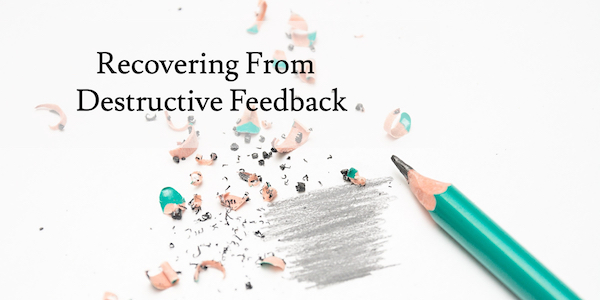 Accepting edits, feedback, and constructive criticism of our writing can be uncomfortable – but to grow as writers, we need to be open to changes that improve the writing. That’s how we work on our craft.
Accepting edits, feedback, and constructive criticism of our writing can be uncomfortable – but to grow as writers, we need to be open to changes that improve the writing. That’s how we work on our craft.
Sometimes, however, feedback doesn’t serve the reader or make the work better. Instead, it targets the writer, shaking their confidence and inhibiting creativity. The effects of this feedback may linger long after the critic is gone.
The Lasting Damage of Misdirected Feedback
I regularly ask people about their writing challenges. A few people share with me stories of carrying around the negative, diminishing comments of thoughtless critics from their past.
- A workplace writer tells the tale of supervisor at work so scathing and “snarky” about her writing that she eventually left the job, beaten down. Although she now has a successful writing career, “the experience haunts me to this day,” she writes.
- A fiction writer hears the voice of a writing coach from his past saying that his stories were “beneath him.” That must help when setting out to write a novel.
My blood boils when I hear these stories. These people abused their positions of power (the supervisor) or trust (a coach).
Reviewers or editors should have their own hippocratic oath: First, do no harm to the writer.
Both stories come from professional writers. They are still writing, with success. No dents or scrapes are visible to the outside world. But these comments from the past hold them back and cause them pain.
These individuals are strong enough to get through it. Other writers may not be so lucky.
How to Handle Destructive Feedback
Many of us have heard this kind of feedback, whether about our writing or some other creative endeavor. You’re no good at this. Don’t give up your day job.
How do we recover from it and keep writing?
On hearing their stories, my first instinct was anger. A supervisor who belittles and demeans employees doesn’t deserve the position. A writing coach who sits in judgment on stories (rather than the execution of them) should reconsider careers.
My second instinct was to argue the facts of the situations. Your stories are fun and told well. Your business writing is clear and effective.
But neither anger nor logic would have much of an effect. The writers had already tried these approaches, and still wrestled with the cloud of negativity. The beast remains on their backs.
It turns out that human beings aren’t entirely rational beings – who knew? We cannot be persuaded of emotional truths by reason alone.
These writers don’t need more positive feedback. They need to change their own narratives. And happily, they have the skills to do that – with writing.
Writing Our Way Out of Problems
We are the stories we tell ourselves.
That’s not merely a profound saying – it’s cognitive reality. Our minds create narratives, which we inhabit. We can use fact that to our advantage.
In 1986, James Pennebaker demonstrated a link between writing about traumatic experiences and physical health. This evolved into the practice of expressive writing, in which people write about traumatic event for four days in a row, about 20 minutes at a time, to process the event, with remarkable results.
The idea isn’t just to stew on the trauma or wrong. That would be ruminating, which is never healthy.
No, the idea behind expressive writing is to construct the narrative around the event. (For details on the method, see the book Expressive Writing: Words That Heal by Pennebaker and John Evans.)
So, could this kind of expressive writing work for writers who are carrying around the after-effects of destructive feedback?
Rewrite Your Story
Olivia Fox Cabane offers an exercise in her book The Charisma Myth that seems like a simplified version of the expressive writing exercise. Try it yourself if you’re carrying around resentment from someone’s harsh or painful words:
- Write a letter to the person who has wronged you with destructive feedback. Outline everything you’d say to them about what happened and how you felt. Don’t send it. You might rewrite the letter for two or three days, if that’s what it takes to gather your thoughts on the situation.
- Next, write a responding letter from that person to you, with everything you wish they would say in it. Go ahead, give yourself a full and complete apology.
- Read through both letters, in sequence. Does it change the way you feel about the situation?
Now you’ve changed the narrative of this experience, writing a different story in which your wrong has been redressed. Even though your logical mind knows that it’s fiction, the emotional part of you may feel satisfied. It sounds crazy, I know. But human beings are kind of crazy.
Although you may still hear the negative critic in your head when facing a new project (and don’t we all), that critic’s voice won’t have the power of resentment or anger behind it. It will be one more bothersome gnat that you can swat away, to get back to writing.
Related Posts
How to Give Effective Writing Feedback
Shut Your Monkey: A Book to Keep You Writing